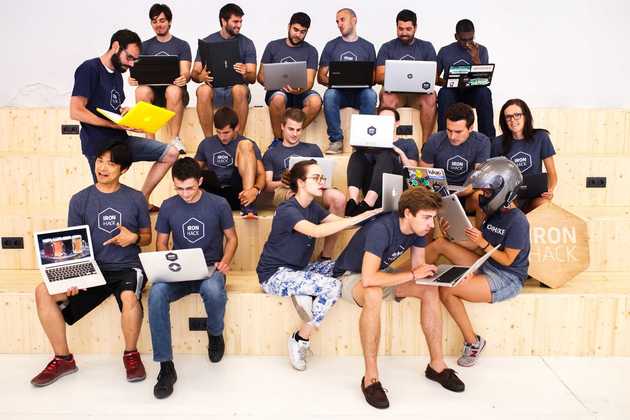The Rise of the Hybrid Profile
Chances are that sooner or later you'll need to deal with code or with someone who codes. The parallelism seems inevitable, learning how to program in the near future can be compared to studying English today.
Proactive, emphatic or focused; these are some of the buzzwords and trending skills that every job offer should contain. Yet, within the tech industry, we are witnessing an increasing demand for a new kind of profile. Geared with a technical toolkit and aimed to thrive among digital products, we call it the “hybrid profile”.
For thousands of years, products consisted of physical goods, such as wheels, shoes or drawers. Nonetheless, today we are interacting more and more with digital products. This transition from the analog to the digital comes with a new set of implications that extend beyond the mere interaction with the end user. It involves a wide range of processes that span from logistics, manufacture, or design, up to the formation of specific teams responsible for the development of the product itself.
The ones who acknowledge this situation and learn the fundamental principles underlying digital products will inevitably have a considerable advantage when having to deal with this new breed of products.
All the components involved in the creation, distribution, and sale of a digital product are, in some way, influenced by the same digital ingredient: code. For this reason, the ones who acknowledge this situation and learn the fundamental principles underlying digital products will inevitably have a considerable advantage when having to deal with this new breed of products.
The Internet has enabled a radical redefinition of the word product that demands a new kind of thinking. Ultimately, that’s the reason of existence for the so-called hybrid profile: people with a strong expertise in traditional areas such as sales, human resources or marketing, that also complement them with technical abilities.
Programming Is Not Only For Programmers
For a long time, coding has been perceived as a vertical and isolated discipline. Disconnected from the rest of the company, programmers were seen as the “computer-experts” dudes sitting in a dark room doing mysterious stuff that nobody really understood. You would only acknowledge their skills when your computer didn’t work: you would simply hand it to them and take it back later on, magically fixed.
The good news is that today programming is not anymore for programmers only. Technology has trickled down in a way that several tools that once used to be exclusive to programmers have now been democratized so more people can have access to them. Technology is becoming more human, and this phenomenon has created a deep link between the digital world and professional roles that used to be isolated from it.
This is our daily routine at Ironhack. Professionals with a wide variety of backgrounds, absolutely unrelated to coding or technology, enroll in our bootcamps to explore what lies in the intersection of technology and their craft.
Being able to read and write doesn’t implicitly mean that we will all be poets. Similarly, having a basic understanding of programming and technology doesn’t necessarily imply that we will code for a living.
The implicit outcome of this trend is that programming has become a completely transversal skill, from human resources to accounting. This argument is not meant to deploy dogmatic statements like “everybody should learn how to code”, it is just the articulation of something that is already happening across all industries.
Being able to read and write doesn’t implicitly mean that we will all need to be poets. Similarly, having a basic understanding of programming and technology doesn’t necessarily presume that we will code for a living. It simply indicates that we will possess a new universal skill which can enrich our professional career.
No matter what you are currently doing, chances are that sooner or later you’ll need to deal with code or with someone who codes. The parallelism seems inevitable, learning how to program in the 21st century can be compared to studying English today: we won’t necessarily write a new Shakespearean play, but we will surely need it in the new cosmopolitan work environment of international companies and start-ups.
The Digital Transformation That Lies Ahead
In a “traditional” company, both product and business units were nicely coupled. They understood what their counterpart did, thus creating a healthy relation and a smooth communication between the two. Salespeople, for instance, had a clear understanding of the product and how to pitch it to suit their customers’ needs. Marketers comprehended the value proposition and clearly identified the go-to-market strategy.
But the moment the product transitions to a place that you no longer understand, a huge disconnection between product and business arises. It generates knowledge asymmetries between the sales force and customers. Marketers no longer understand where their users are to be found and how to target them appropriately. Overnight, the rules of your game have dramatically changed and the only way to keep playing is to adapt.
In a “traditional” company, both product and business units were perfectly aligned. They understood what their counterpart did. But the moment the product transitions to a place that you no longer understand, a huge disconnection between product and business emerges.
As a campus manager here in Barcelona, I’ve been lucky enough to see remarkably smart people going through such digital transformation.
Markus for instance, is a Harvard MBA 2019 which currently works as Global Venture Developer at Rocket Internet. When he enrolled in our Web Development Bootcamp, he told me: “my desire is not to become the world’s best developer. Maybe I will never again write a line of code after the bootcamp. However, I want to understand how to develop the products of the future - through software. This skill will help me in just about every industry”.
Markus is the poster child example of a great marketer that has “hacked” the digital channels to reach their customers and find new market opportunities. But it’s not only about marketing though, Andreu, came to Ironhack Barcelona to transition from consultancy to a software PM position. Today he’s working as a PM at the startup Onebox. His experience at our bootcamp turned him into a true hybrid profile, with a clear technical understanding of digital products. In his own words: “Ironhack is more than just coding skills and learning best practices. I came out with a new mentality and a better understanding of the entire software development process. This is a priceless asset for a product manager like me”.
The Need For A Hybrid Profile
Yet the need for hybrid profiles in the industry is just the tip of the iceberg. With the increasing growth of digital products, the gap between non-technical and technical profiles will only get broader. At the end of the day, when you are starting up and your whole team still fits in a room, you’ll barely notice such disconnection. But truly native digital companies that have scaled to +100 employees are already suffering from that.
That’s where the value of hybrid profiles comes in. Hybrid profiles are able to bridge this gap and establish again a healthy relation between parties inside the company. This is something that might not be a mainstream issue yet, but we are seeing it day after day at Ironhack.
Not only is technology drastically changing the set of skills required in a modern job, but it is also reshaping traditional roles. Hybrid positions today earn a salary which is 25% above the average. Just in the United States, more than 250.000 hybrid jobs will be created in the upcoming years.
It is really important that we face this problem and we empower the next generation to lead this transition to the digital world. We are flooding the market with digital products faster than our ability to understand them. So it’s our responsibility to care about the things we put in the hands of the people, not just from a P&L perspective, but understanding what they are and the implications they’ll have in the long run. All of this will require a new way of thinking about products, and it will certainly involve code and programming skills.

